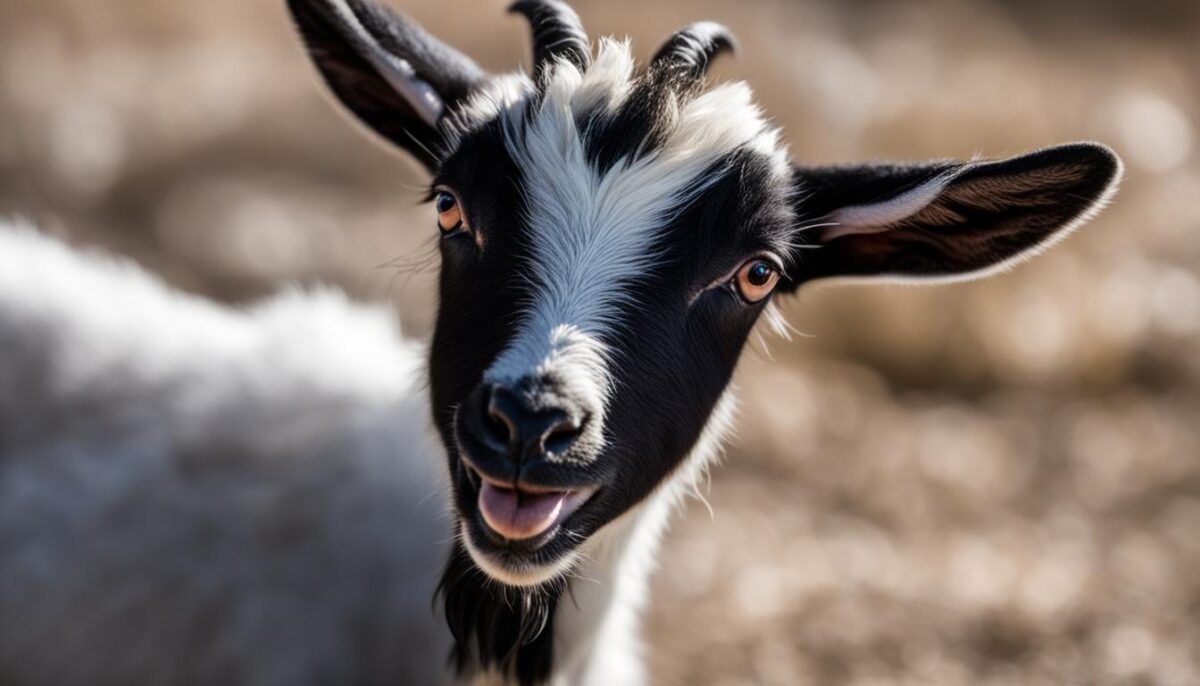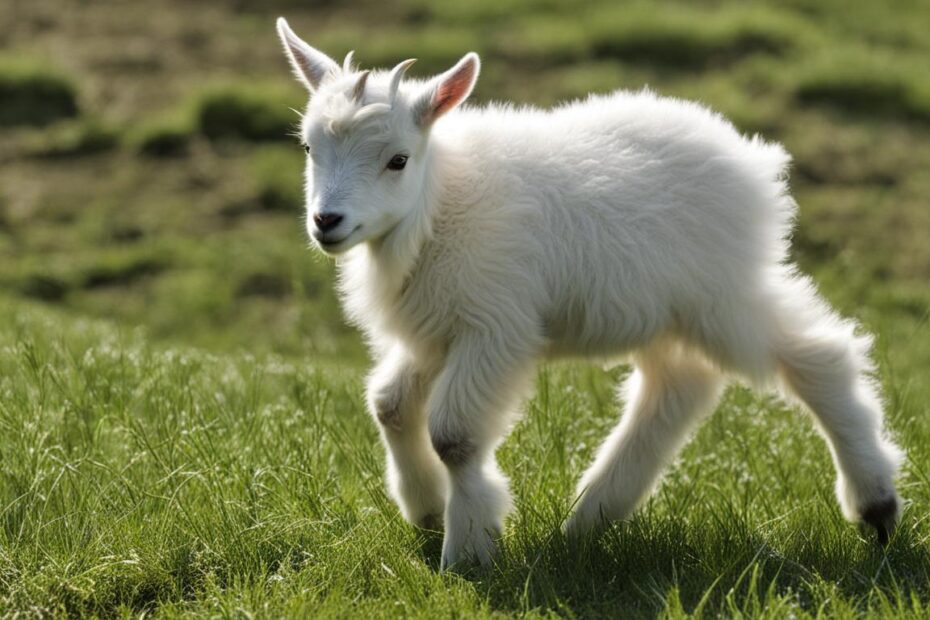Foaming at the mouth in baby goats can be a cause for concern for goat owners. It is not a common occurrence, but when it does happen, it is important to understand the possible causes and take appropriate action to ensure the health and well-being of the goat. There are several factors that can contribute to a baby goat foaming at the mouth, including bloat, poisoning, excessive salivation, uneven teeth, and diseases. It is crucial to identify the underlying cause and provide the necessary treatment to prevent any further complications.
Key Takeaways:
- Bloat, poisoning, excessive salivation, uneven teeth, and diseases are potential causes of foaming at the mouth in baby goats.
- Signs to watch for include lack of appetite, discomfort, abdominal inflation, pain or tense facial muscles, grinding teeth, kicking the belly, frequent urination, stilted walk, difficulty breathing, and lying down.
- Ensuring your goat’s overall health involves proper care and management, including a balanced diet, regular veterinary check-ups, vaccination, deworming, and maintaining a clean and safe environment.
- Treatment for foaming at the mouth in baby goats depends on the underlying cause and should be determined by a veterinarian.
- By staying vigilant and taking prompt action, goat owners can minimize the risk of foaming at the mouth and promote the overall health of their baby goats.
Causes: Bloat in Baby Goats
Bloat is one of the most common causes of a baby goat foaming at the mouth. It occurs when the goat overeats lush, damp feed such as clover, alfalfa, or legume pastures. Bloat is characterized by the over-distention of the rumen (forestomach) with gases of fermentation. The rumen expands with foam, leading to excessive pressure from gas buildup on the diaphragm. Foamy bloat, a type of bloat, is more dangerous than dry bloat as it can cause respiratory or circulatory failure due to the excessive gas pressure.
To understand the severity of the situation, here is a comparative table of symptoms and treatment options for foamy and dry bloat:
| Bloat Type | Symptoms | Treatment |
|---|---|---|
| Foamy Bloat | Excessive salivation, distended abdomen, respiratory distress | Emergency intervention, administration of anti-foaming agents or surgical procedures |
| Dry Bloat | Distended abdomen, discomfort | Relieve gas buildup through stomach tubing or trocarization |
It is crucial to monitor the baby goat’s diet and ensure they have a balanced feed and access to fresh, dry hay. Additionally, avoiding sudden changes in diet and providing adequate exercise can help prevent bloat in baby goats.
Remember, if you suspect bloat in your baby goat, it is important to seek veterinary assistance promptly to prevent any further complications.
Causes: Poisoning in Baby Goats
Another potential cause of foaming at the mouth in a baby goat is poisoning. Organophosphate poisoning, in particular, can cause a goat to foam at the mouth. There are three types of organophosphate poisoning: acute foam, intermediate foam, and delayed foam. Each type has different clinical signs and affects different systems in the goat’s body. Acute foam is due to the irreversible inhibition of the acetylcholinesterase enzyme, while intermediate foam causes generalized muscle weakness. Delayed foam is associated with the degeneration of distal axons in the peripheral and central nervous systems.
Organophosphates are commonly found in certain insecticides and can be accidentally ingested by baby goats. Symptoms of organophosphate poisoning can include excessive salivation, foaming at the mouth, respiratory distress, muscle tremors, diarrhea, and weakness. It is crucial to seek immediate veterinary attention if poisoning is suspected, as prompt treatment can be life-saving for the goat.
| Type of Poisoning | Clinical Signs | Affects on the Body |
|---|---|---|
| Acute Foam | Excessive salivation, foaming at the mouth, respiratory distress, muscle tremors, diarrhea, weakness | Irreversible inhibition of the acetylcholinesterase enzyme |
| Intermediate Foam | Generalized muscle weakness, excessive salivation, foaming at the mouth, difficulty breathing | Weakness in the muscles |
| Delayed Foam | Excessive salivation, foaming at the mouth, trembling, muscle weakness | Degeneration of distal axons in the peripheral and central nervous systems |
“Organophosphate poisoning can have severe consequences for baby goats, affecting their nervous system and causing symptoms such as excessive salivation, foaming at the mouth, and muscle weakness. Immediate veterinary attention is crucial to save the goat’s life and provide appropriate treatment.”
Causes: Excessive Salivation in Baby Goats
Excessive salivation can be a reason for a baby goat foaming at the mouth. There are various factors that can lead to excessive salivation in goats, including irritation in the mouth or throat, dental problems, or certain diseases. When a goat produces excess saliva, it can result in foaming at the mouth.
To determine the underlying cause of excessive salivation, it is essential to observe the goat’s behavior and overall health. If the goat is experiencing discomfort, difficulty eating or swallowing, or showing other signs of distress, it is crucial to consult a veterinarian for a proper diagnosis.
In some cases, dental issues such as uneven teeth can contribute to excessive salivation. Regular dental care, which may include teeth trimming, can help prevent this problem. Additionally, ensuring the goat’s diet is balanced and free from any irritants or toxins can help alleviate excessive salivation.
Table: Common Causes of Excessive Salivation in Baby Goats
| Cause | Symptoms |
|---|---|
| Irritation in the mouth or throat | Excessive drooling, foaming at the mouth |
| Dental problems | Difficulty eating or swallowing, excessive saliva production |
| Certain diseases | Additional symptoms may vary depending on the specific disease |
“Observing your baby goat’s behavior and consulting with a veterinarian can help identify the cause of excessive salivation and determine the appropriate treatment.”
It is important to note that excessive salivation can be a symptom of an underlying health issue, and prompt veterinary attention is crucial for proper diagnosis and treatment. By addressing the underlying cause and providing appropriate care, you can help ensure the health and well-being of your baby goat.

Causes: Uneven Teeth in Baby Goats
Uneven teeth can contribute to a baby goat foaming at the mouth. When a goat’s teeth are not properly aligned, it can lead to difficulty in chewing and swallowing food. This can result in excess saliva production and foaming at the mouth. Regular dental care, including trimming the goat’s teeth if necessary, can help prevent this issue.
If a baby goat has uneven teeth, it may experience discomfort while eating and may not receive proper nutrition. This can lead to poor growth and overall health issues. It is important for goat owners to regularly check the alignment of their baby goat’s teeth and take necessary steps to address any unevenness.
Trimming the goat’s teeth can be done by a veterinarian or an experienced goat owner who is familiar with the procedure. It is important to ensure that the trimming is done safely and without causing any harm or pain to the goat. Regular dental care can help promote proper chewing, digestion, and overall well-being in baby goats.
Table: Common Signs of Uneven Teeth in Baby Goats
| Signs of Uneven Teeth | Description |
|---|---|
| Excessive drooling | Baby goat may have excessive saliva production and foaming at the mouth. |
| Difficulty eating | Baby goat may struggle to chew and swallow food properly. |
| Weight loss or poor growth | Baby goat may not be receiving proper nutrition due to difficulty in eating. |
| Pain or discomfort | Baby goat may show signs of pain or discomfort while eating. |
By addressing uneven teeth in baby goats, goat owners can help ensure proper nutrition, growth, and overall health. Regular dental care is an essential part of goat management and can contribute to the well-being of these adorable animals.
Causes: Diseases in Baby Goats
Diseases can be a significant factor leading to foaming at the mouth in baby goats. Various viral infections and parasitic infestations can affect the health of a goat and manifest in symptoms such as excessive salivation and foaming at the mouth. Understanding the common diseases that can cause these symptoms is crucial for prompt diagnosis and treatment.
Types of Diseases
There are several diseases that can contribute to foaming at the mouth in baby goats. Some of the common ones include:
- Caprine Arthritis Encephalitis (CAE): This viral infection affects the joints and the central nervous system, leading to symptoms such as lameness, weakness, and neurological issues. It can cause excessive salivation and foaming at the mouth in affected goats.
- Caseous Lymphadenitis (CL): CL is a bacterial infection that primarily affects the lymph nodes, leading to the formation of abscesses. The disease can cause discomfort and pain, resulting in a baby goat foaming at the mouth.
- Ovine Progressive Pneumonia (OPP): OPP is a viral disease that primarily affects the lungs and respiratory system of goats. It can cause difficulty breathing, coughing, and excessive salivation.
- Parasitic Infections: Parasites such as coccidia and worms can affect the digestive system of baby goats, leading to gastrointestinal issues and foaming at the mouth.
Treatment and Prevention
Treating diseases in baby goats requires a proper diagnosis from a veterinarian. Treatment options may include administration of specific medications, supportive care, and isolation of affected goats to prevent further spread of the disease.
Preventing diseases in baby goats involves implementing good management practices, such as maintaining a clean and sanitary environment, regular deworming and vaccination, and quarantining new animals before introducing them to the herd. Additionally, practicing biosecurity measures, such as minimizing contact with other goat herds and controlling insect vectors, can help prevent the spread of diseases.
Signs to Watch For
When a baby goat starts foaming at the mouth, there are several signs to watch for. These symptoms can indicate underlying health issues that require attention. It is important for goat owners to be vigilant and take prompt action if any of these signs are observed:
- Lack of appetite: If the baby goat suddenly loses interest in eating or reduces its food intake significantly, it could be a sign of a problem.
- Discomfort: If the goat appears restless, agitated, or displays signs of pain or discomfort, it could indicate an underlying issue.
- Abdominal inflation: A visibly distended abdomen, especially if accompanied by signs of discomfort, can be a sign of bloat or other digestive problems.
- Pain or tense facial muscles: If the baby goat demonstrates facial muscle tightness, grimacing, or signs of pain, it may indicate dental issues or other health concerns.
- Grinding teeth: Audible teeth grinding can be a sign of pain or discomfort in the goat’s mouth or gastrointestinal tract.
- Kicking the belly: If the baby goat kicks or strikes its belly repeatedly, it may be experiencing abdominal pain or discomfort.
- Frequent urination: Excessive urination, particularly if accompanied by other symptoms, can indicate a urinary tract infection or other urinary issues.
- Stilted walk: A noticeable change in the goat’s gait, such as stiffness or lameness, may indicate musculoskeletal or neurologic issues.
- Difficulty breathing: Labored or rapid breathing, wheezing, or coughing can be signs of respiratory problems or lung issues.
- Lying down: If the baby goat lies down more frequently or appears weak or lethargic, it may be a sign of illness or pain.
If any of these signs or symptoms are observed, it is crucial to seek immediate veterinary care. A professional diagnosis and appropriate treatment can help address the underlying cause of the foaming at the mouth and ensure the baby goat’s health and well-being.
Ensuring Your Goat’s Health
Proper care and management are crucial for ensuring the health and well-being of your baby goat. By following a few key practices, you can minimize the risk of foaming at the mouth and other health issues.
Nutrition
A balanced diet is essential for your baby goat’s overall health. Provide high-quality hay, fresh water, and a suitable grain mix formulated for goats. Avoid feeding excessive amounts of lush, damp feed, as it can lead to bloat, one of the common causes of foaming at the mouth.
Veterinary Care
Regular veterinary check-ups are important for monitoring your baby goat’s health and identifying any underlying issues. Vaccinations and deworming should be done according to the veterinarian’s recommendations to prevent diseases and parasites.
Clean and Safe Environment
Maintaining a clean and safe living environment is essential for your baby goat’s health. Regularly clean the goat’s shelter, ensuring it is free from feces and urine buildup. Provide adequate ventilation and protection from extreme weather conditions.
| Key Points | Benefits |
|---|---|
| Proper nutrition | Ensures adequate growth and development |
| Regular veterinary care | Detects and treats any health issues early |
| Clean environment | Reduces the risk of diseases and parasites |
Stress Management
Minimize stress for your baby goat by providing a calm and comfortable environment. Avoid sudden changes in routine, excessive noise, and overcrowding. Additionally, provide opportunities for exercise and mental stimulation to promote overall well-being.

Treatment Options for Foaming at the Mouth in Baby Goats:
| Cause | Treatment |
|---|---|
| Bloat | Antifoaming agents or emergency surgical procedures |
| Poisoning | Appropriate antidotes or supportive treatments |
| Excessive salivation | Identification and treatment of underlying cause |
| Uneven teeth | Regular dental care, including teeth trimming if necessary |
| Diseases | Diagnosis and treatment of underlying disease |
It is important to remember that prevention is always better than treatment. Providing proper care and management to baby goats, including a balanced diet, regular veterinary check-ups, vaccination, deworming, and maintaining a clean and safe environment, can help minimize the risk of foaming at the mouth and other health issues.
Conclusion
Foaming at the mouth in baby goats can be a sign of various underlying issues that require prompt attention. Whether it’s bloat, poisoning, excessive salivation, uneven teeth, or diseases, it is crucial for goat owners to stay vigilant and take the necessary steps to ensure their baby goats’ health and well-being.
By closely observing any signs of foaming at the mouth in baby goats and consulting a veterinarian for a proper diagnosis and treatment plan, goat owners can effectively address the root cause of the issue. It is important to provide appropriate care and management, including a balanced diet, regular veterinary check-ups, and a clean environment, to minimize the risk of foaming at the mouth and promote overall goat health.
Remember, your baby goats rely on you for their care. By staying informed, proactive, and attentive to their needs, you can help them thrive and lead healthy lives. If you notice any signs of foaming at the mouth, don’t hesitate to seek professional assistance, as early intervention can make a significant difference in the well-being of your baby goats. Take the necessary steps to ensure their ongoing health and enjoy the rewards of raising happy and healthy baby goats.
FAQ
What are the common causes of a baby goat foaming at the mouth?
The common causes include bloat, poisoning, excessive salivation, uneven teeth, and diseases.
What is bloat in baby goats?
Bloat is the over-distention of the rumen (forestomach) with gases of fermentation, usually caused by overeating lush, damp feed.
How can poisoning cause a baby goat to foam at the mouth?
Organophosphate poisoning, in particular, can cause a goat to foam at the mouth. There are different types of organophosphate poisoning with varying symptoms.
What can lead to excessive salivation in baby goats?
Excessive salivation can occur due to various factors such as mouth or throat irritation, dental problems, or certain diseases.
How can uneven teeth contribute to a baby goat foaming at the mouth?
Uneven teeth can make it difficult for a goat to chew and swallow food, leading to excess saliva production and foaming at the mouth.
What diseases can cause a baby goat to foam at the mouth?
Various diseases, ranging from viral infections to parasitic infestations, can cause a baby goat to foam at the mouth.
What signs should I watch for if my baby goat is foaming at the mouth?
Look for a lack of appetite, discomfort, abdominal inflation, pain or tense facial muscles, grinding teeth, kicking the belly, frequent urination, stilted walk, difficulty breathing, and lying down.
How can I ensure the overall health of my baby goat?
Provide proper care and management, including a balanced diet, regular veterinary check-ups, vaccination, deworming, and maintaining a clean and safe environment for the goat.
How should foaming at the mouth in baby goats be treated?
The treatment depends on the underlying cause and may involve the use of antifoaming agents, emergency surgical procedures, antidotes, or supportive treatments. It is important to consult a veterinarian for a proper diagnosis and tailored treatment plan.


